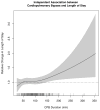Risk factors for delirium after cardiac surgery: a historical cohort study outlining the influence of cardiopulmonary bypass
- PMID: 28718100
- PMCID: PMC5693689
- DOI: 10.1007/s12630-017-0938-5
Risk factors for delirium after cardiac surgery: a historical cohort study outlining the influence of cardiopulmonary bypass
Abstract
Purpose: Cardiopulmonary bypass (CPB) induces a significant inflammatory response that may increase the risk for delirium. We hypothesized that exposure to CPB during coronary artery bypass grafting (CABG) surgery would correlate with an increased risk of delirium.
Methods: We reviewed clinical data from two databases at our medical centre - the Cardiac Surgery Perioperative Outcomes Database and the Society of Thoracic Surgeons Database. Patients undergoing elective CABG surgery (on-pump and off-pump) from November 1, 2009 to September 30, 2015 were included in the study. Delirium was defined as any postoperative positive Confusion Assessment Method for the Intensive Care Unit exam during the intensive care unit stay. We performed logistic regression to isolate the association between CPB exposure and delirium adjusted for predetermined risk factors and potential confounders.
Results: During the study period, 2,280 patients underwent elective CABG surgery, with 384 patients (16.9%) exposed to CPB. Delirium was diagnosed in 451 patients (19.8%). Exposure to CPB showed a significant independent association with delirium. Patients exposed to CPB for 142 min (90th percentile of CPB duration) vs those exposed for 54 min (10th percentile) had an adjusted relative risk (RR) of delirium of 2.18 (95% confidence interval [CI], 1.39 to 3.07; P = 0.002) vs a RR of 1.51 (95% CI, 0.92 to 2.29; P = 0.10), respectively.
Conclusions: The use and duration of cardiopulmonary bypass were associated with an increased risk of delirium in patients undergoing CABG surgery.
Trial registration: www.clinicaltrials.gov , NCT02548975. Registered 4 September 2015.
Conflict of interest statement
Figures



References
-
- Inouye SK. Delirium in older persons. The New England journal of medicine. 2006;354(11):1157–65. - PubMed
-
- Chaput AJ, Bryson GL. Postoperative delirium: risk factors and management: continuing professional development. Canadian journal of anaesthesia = Journal canadien d’anesthesie. 2012;59(3):304–20. - PubMed
-
- Mariscalco G, Cottini M, Zanobini M, Salis S, Dominici C, Banach M, et al. Preoperative statin therapy is not associated with a decrease in the incidence of delirium after cardiac operations. The Annals of thoracic surgery. 2012;93(5):1439–47. - PubMed
MeSH terms
Associated data
Grants and funding
LinkOut - more resources
Full Text Sources
Other Literature Sources
Medical

